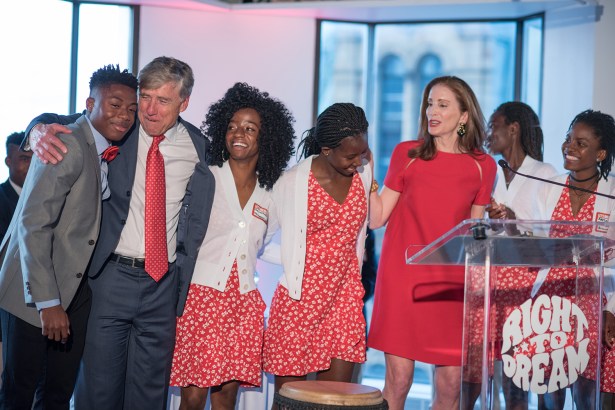Boston Properties’ John Powers Is Helping the Youth of West Africa Dream Big
The former CBRE executive runs New York for the country's largest office landlord, but his most important role is with Ghana-based school and soccer academy Right to Dream
By Rey Mashayekhi June 27, 2018 9:45 am
reprints
Over the course of more than three decades in New York City’s commercial real estate business, John Powers has carved out a near-legendary reputation for himself.
As an office leasing broker at Edward S. Gordon Company in the 1980s, Powers and ESG executive Marty Turchin helped usher the profession from its transaction-minded, wheeling-and-dealing status quo into the more sophisticated, advisory-oriented model—that of the broker as a trusted consultant to their clients’ organizational real estate needs—that is now common practice at all of the city’s major brokerages.
At CBRE—where he served as chairman of the brokerage’s New York tri-state region—Powers, alongside colleagues Mary Ann Tighe and Robert Alexander, helmed one of the powerhouses of the city’s commercial real estate industry, representing both institutional landlords and major corporate tenants on some of the city’s largest real estate transactions.
And at Boston Properties, where he has been executive vice president of the real estate investment trust’s New York region since 2014, he oversees the leasing, management and development of a portfolio spanning roughly 12 million square feet—including some of the city’s most prestigious trophy office towers—for the largest commercial office landlord in the U.S.
But all of that pales in comparison to perhaps Powers’ most important role: that of founder and chairman of the board of Right to Dream USA. The nonprofit functions as the U.S. arm of Right to Dream, a school and soccer academy in Ghana that has provided more than 200 West African children—many coming from backgrounds of extreme poverty—with a place to live, study and learn as both students and soccer players. The academy has earned a reputation for one of the most highly regarded youth soccer teams in the world, with more than 30 Right to Dream graduates having gone on to pursue professional careers in the sport.
Under Powers’ guidance, Right to Dream USA has allowed more than 40 young men and women from the Ghana academy to attend some of the most elite private schools in the U.S. as student-athletes—with virtually all of them going on to secure athletic scholarships at universities across the country.
Powers and his family have devoted a remarkable amount of time and energy toward advancing Right to Dream’s mission in the U.S.; he and his wife, Maureen, have opened up their home in Rye, N.Y., to dozens of Right to Dreamers who have arrived from Ghana to study at boarding schools like Hotchkiss and Millbrook, and have enlisted friends and supporters—including colleagues in the commercial real estate industry and even Powers’ own boss, Boston Properties CEO Owen Thomas—to host kids of their own.
“There’s no staff at Right to Dream; it’s all volunteer,” Powers, who has three adult children, explained recently at Boston Properties’ offices at 599 Lexington Avenue. “I know all of the kids—all the kids have stayed at my house. I have 13 [Right to Dream students] in high school now, and we have a big year coming [in the fall]; we’ll pick up five more at JFK [International Airport], three girls and two boys.”
Like a father fretting over an empty nest, he added: “I have a rule—I like the schools within two hours of my house.”
Powers first became acquainted with Right to Dream—which was founded in 1999 by Tom Vernon, a former scout for English soccer club Manchester United who left his role with the team to start the academy—through his son Kevin’s soccer coach at the Hotchkiss School in Connecticut. After taking in a young man, CK Kumah, who had arrived from the academy to study and play at Hotchkiss in 2006, Powers became acquainted with Vernon.
“We kind of clicked straight away,” Vernon told Commercial Observer. “Our mission and vision for our kids was something that deeply connected with him, and he’s given a significant portion of his life to it. In terms of what’s been going on in the States, he’s the guy who’s guided it and has been transformational in the growth of Right to Dream.”

The commitment to the cause is very much a family affair; Powers’ daughter Kerry, a senior associate at real estate investment firm Savanna, is an integral part of Right to Dream USA’s operations, organizing the nonprofit’s annual fundraising benefit and helping lead the launch of Right to Dream’s girls’ program in 2013. Powers’ other daughter Courtney, a schoolteacher in Greenwich, Conn., was also involved in starting the girls’ program and has taught at the academy in Ghana in the past. (His son, Kevin, worked for Deutsche Bank’s commercial real estate group for several years and is now pursuing a master’s degree in business administration at London Business School.)
“My dad always valued what athletics can teach you and what being part of a team can teach you, [in terms of] life lessons,” Kerry Powers said. “The ability to learn and nurture through sports and education, that mission resonated with him.”
Together, the father-daughter duo have parlayed their real estate industry connections to raise millions for the organization. Patrons include board members Julia Simet, a managing principal at design and architecture firm Gensler, and Tara Stacom, the Cushman & Wakefield executive vice chairman who was honored earlier this month at Right to Dream USA’s annual fundraising benefit, held at Boston Properties’ General Motors Building in Midtown.
“John is leagues apart from anyone I’ve ever met,” Stacom told CO. “He meets every one of these kids off the plane, takes them to his house, helps them acclimate whether they need a dentist appointment or a shoulder to cry on because something’s not right. He’s completely immersed in every one of [the organization’s] children’s lives, and they revere him and show it with the love that they give John.”
Also among Right to Dream USA’s real estate industry patrons is Robert Alexander, the chairman of CBRE’s New York tri-state region who has known Powers since their days together at Edward S. Gordon Company in the 1980s. Alexander said his former colleague’s work with Right to Dream is a testament to an “ability and desire to accomplish things that leaves no stone unturned,” as well as the 71-year-old Powers’ remarkable energy. “Even at this point of his career, he can pick up a bike and ride 40 miles or play two hours of singles tennis,” Alexander said.
That commitment and energy served Powers well during his years in the brokerage business. He joined Edward S. Gordon Company in 1986 after eight years at Swiss Bank Corp. (now UBS); after working with ESG’s Marty Turchin to helm the bank’s development of the former Swiss Bank Tower at 623 Fifth Avenue, Alexander recalled that “Marty turned around and hired him” to join ESG.
At ESG, Powers and Turchin built and ran the brokerage’s vaunted consulting division, which sought to provide clients with a level of service beyond what was typically expected of commercial office brokers at the time—revolutionizing the brokerage business in the process.
“They reformatted the company’s entire approach to corporate real estate leasing and consulting,” Alexander said. “What John brought to the table in the mid- to late-‘80s, along with Marty, was a rational, corporate approach to the real estate issues that major corporations had to deal with. They really took the business in a whole new direction—more of an investment banking mode than wily brokers running around throwing space.”
While ESG “were not alone” in understanding the need for a more sophisticated level of brokerage at the time, Bruce Mosler—now the chairman of global brokerage at one of ESG’s competitors at the time, Cushman & Wakefield—said Powers’ work helped the industry evolve at a time when “it was clear that clients were demanding a different kind of service.”
“Real estate was becoming a much more significant cost, and as a result of that clients very much required a different level of expertise,” Mosler said. “What John and Marty and [ESG founder] Ed Gordon and others recognized was there was a need to provide a much higher level of advisory, and they did innovate in that regard. If you didn’t move to that, you were going to be left behind by your client.”
In addition to expressing great admiration for Powers’ work with Right to Dream, Mosler was complimentary of Powers as a “consummate professional,” even when he’d be on the opposite side of the negotiating table in his days as a broker.
“John is one of those people who, when you’re working a deal, you know you’re going to get a straight answer,” Mosler said. “He doesn’t try to complicate; he tries to simplify solutions. He’s a person you enjoy working with because he has an approach that’s transparent and clear on what he has to achieve, while fighting for his client all the time. It’s a level of professionalism that is not an everyday occurance [in the industry].”

Powers stayed with ESG after the firm was bought by Insignia Financial Group in 1996 and became Insignia/ESG. And after CBRE acquired Insignia/ESG in 2003, Powers, Alexander and Mary Ann Tighe (now CEO of CBRE’s New York tri-state region) led what was now indisputably one of the largest and most powerful firms in New York City commercial real estate.
Along the way, Powers developed a relationship with the Boston Properties braintrust of Mortimer Zuckerman and Ed Linde, the company’s co-founders. So when Boston Properties reached out to Powers in 2013 about joining the team, Powers knew exactly what to expect in switching from the brokerage business to the principal side of the industry.
“I’d been an adviser to Boston Properties, Mort Zuckerman and Ed Linde for probably 20 years before I came here, so I knew everyone and I knew them very well,” Powers said. “It was not much of an adjustment. I’ve often said it’s a little like if you’re a Broadway actor; you’ve come in and you’ve played the part, and now they’re asking you to be on the same stage in the same play but in a different part. It’s a little different, but it’s not all new.”
Thomas, who had only recently been installed as the REIT’s CEO at the time, described Powers as “the obvious choice” in the search to find a new head of the company’s New York operations.
“He’s a highly seasoned professional with a tremendous amount of expertise and experience in the New York market, and was for many years a trusted adviser to Mort and Ed on our leasing activities in New York City,” Thomas said. “He was a trusted adviser because he’s so good. John is very smart and sophisticated and creative in deal structure; whenever there’s a gap between tenant and landlord, buyer and seller, he can come up with a creative solution for a win-win outcome.”
In his role at Boston Properties, Powers has spearheaded the REIT’s initiative to upgrade and improve Midtown office buildings like 599 Lexington Avenue, 601 Lexington Avenue and 399 Park Avenue in order to keep them competitive with the newly constructed office towers of Hudson Yards and the Far West Side. He’s also led the firm’s first venture in Brooklyn via Dock 72—the WeWork-occupied, amenity-laden office building in the Brooklyn Navy Yard that Boston Properties is developing alongside Rudin Management Company.
And Powers is also positioning the firm to enter the Far West Side market itself via a partnership with the Moinian Group on its planned 2-million-square-foot office tower at 3 Hudson Boulevard. While that transaction is not yet complete, the REIT has acknowledged that it’s in talks with Moinian after reports of the deal emerged earlier this year; Thomas said he’s “hopeful that we will complete an investment” in a minority stake in the project, with Boston Properties serving as co-developer.
But besides the dollars and cents of real estate, Thomas said that Powers has brought to Boston Properties an emphasis on “recruiting the best talent and making sure they’re trained and mentored for success”—something that should come as no surprise given the extent to which he has poured himself into his work with the young men and women he’s nurtured through Right to Dream.
“He’s definitely mentored a lot of people in his career, and I think Right to Dream is his way to continuing mentoring,” said Kerry Powers, who noted her father’s valuable advice in helping her pursue a career in the commercial real estate business.
“He’s always said to me, and probably other people, that this whole industry is about three different things: money, people and buildings,” Kerry Powers said. “If you want to be successful, you have to understand two of those things. And if you want to be really successful, you have to understand all three.”
Right to Dream, John Powers said, takes a similar approach in instilling its young men and women with the values and knowledge they need to succeed—not in real estate, but in life.
“The basis of Right to Dream is athletics, academics and character,” he said. “And character is the most important of the three, in terms helping them develop and getting them to where they have to go.”



